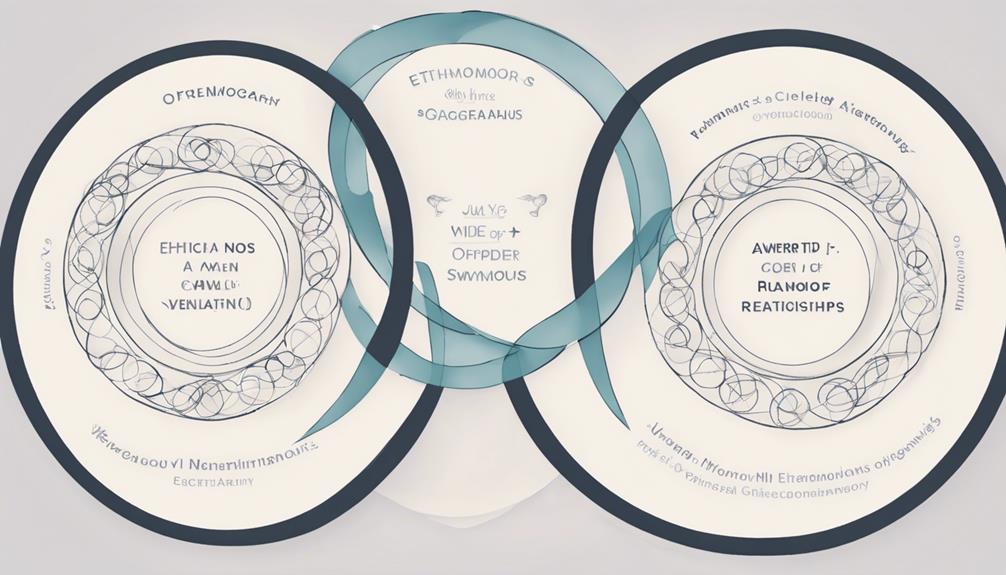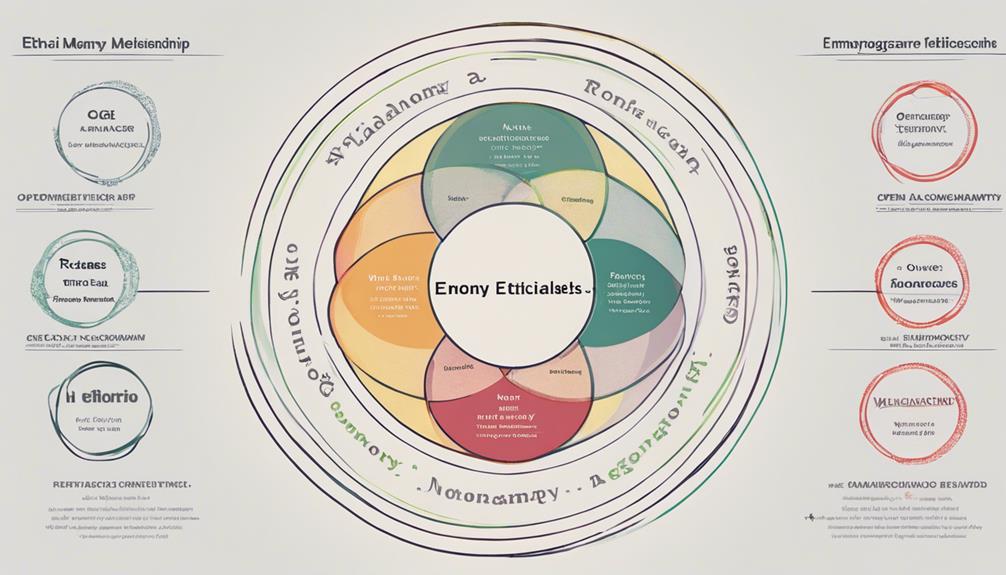Delving into ethical non-monogamy leads to contemplation on the intricacies of polyamory and partnership. What distinguishes this relationship style from traditional monogamy?
Understanding the intricacies of ethical non-monogamous relationships unveils a world of diverse dynamics and complexities that challenge conventional norms, offering a glimpse into alternative approaches to intimacy and connection within the realm of ethical non-monogamy.
Key Takeaways
- Ethical Non-Monogamy encompasses various relationship models like polyamory and primary/secondary structures.
- Communication, honesty, and respect are foundational principles in Ethical Non-Monogamy dynamics.
- Managing jealousy, setting boundaries, and navigating societal challenges are key aspects of Ethical Non-Monogamy.
- Open dialogue, clear boundaries, and mutual understanding are essential for successful Ethical Non-Monogamous relationships.
Understanding Ethical Non-Monogamy
In exploring the realm of Ethical Non-Monogamy (ENM), we delve into the practice of engaging in consensual non-monogamous relationships with multiple partners. This form of relationship is built upon the pillars of honesty, communication, and respect. By fostering an environment where open dialogue is encouraged and boundaries are clearly defined, ENM allows individuals to navigate their desires and connections in a way that honors everyone involved.
In the realm of ethical non-monogamous relationships, satisfaction isn't compromised by the presence of multiple partners. Studies indicate that individuals in ENM setups experience similar levels of relationship satisfaction compared to those in monogamous relationships. What sets non-monogamous relationships apart is the emphasis on communication and openness, leading to a higher sense of contentment among partners.
Understanding the nuances of ethical non-monogamy requires a deep appreciation for the complexities of human connections. By prioritizing consensual agreements, honest conversations, and mutual respect, ENM offers a unique path to fulfilling and sustainable relationships.
Types of ENM Relationships

Exploring the diverse landscape of Ethical Non-Monogamous (ENM) relationships reveals a spectrum of dynamic and fulfilling connections that encompass various forms of intimacy. From polyamory, where individuals cultivate multiple intimate relationships, to the Primary/Secondary model that allows for emotional commitment to a primary partner while engaging with others, ENM relationships offer a range of possibilities.
Closed V arrangements feature one person romantically connected to two others who aren't romantically involved with each other, fostering unique dynamics and connections. Throuple/Quad relationships consist of three or four individuals romantically involved with each other, navigating complex but rewarding bonds.
Monogamish relationships, on the other hand, occasionally involve other partners for specific needs while maintaining a primary relationship at the core. These types of relationships exemplify the flexibility and diversity found within ethical non-monogamy, providing individuals with the opportunity to explore intimacy and connection with multiple partners in consensual and fulfilling ways.
Key Principles of ENM
Understanding the core principles of Ethical Non-Monogamy (ENM) is essential for fostering healthy and respectful relationships with multiple partners. When practicing ENM, it's crucial to uphold the following key principles:
- Honesty: Open and honest communication is the foundation of ethical non-monogamous relationships. Being transparent about your feelings, desires, and boundaries creates trust and mutual understanding among all individuals involved.
- Communication: Regular and clear communication is key to navigating the complexities of ENM. Discussing expectations, checking in on feelings, and addressing any concerns openly helps maintain strong connections and ensures everyone feels heard and valued.
- Respect: Treating all partners with respect is fundamental in ethically practicing non-monogamy. Respecting boundaries, honoring agreements, and acknowledging the autonomy and feelings of each person involved fosters a supportive and caring environment for all parties.
Challenges in ENM Dynamics

Navigating challenges in Ethical Non-Monogamy dynamics requires open communication, empathy, and a commitment to understanding and addressing individual needs within the relationships. Jealousy and insecurity can surface when sharing affection and time among multiple partners, demanding honest conversations and reassurance. Communication breakdowns might sow seeds of misunderstandings and conflicts in ENM relationships, emphasizing the necessity of clear and frequent dialogues.
Balancing time and attention between partners is a delicate dance, requiring mindful scheduling and consideration to ensure everyone feels valued and cared for. Setting and respecting boundaries becomes crucial to safeguard the emotional well-being of all involved, preventing complications and fostering trust.
Moreover, managing societal stigma and external challenges can add layers of complexity, demanding resilience and unity within the relationship. By facing these obstacles head-on with compassion and mutual understanding, ENM dynamics can flourish amidst adversity.
Navigating Communication in ENM
Fostering open and honest communication is the cornerstone of thriving in ethical non-monogamous relationships. When navigating communication in ENM, here are some key points to consider:
- Discussing thoughts, feelings, and expectations: Sharing openly about your inner world can foster understanding and lead to mutual agreement on important aspects of your relationship dynamic.
- Addressing breaches of rules promptly: It's crucial to address any violations of agreed-upon rules swiftly and effectively. Doing so helps maintain trust and respect among all partners involved.
- Communicating boundaries, desires, and needs: Having conversations about boundaries, desires, and needs plays a vital role in the dynamics of ENM. It allows everyone to feel heard and understood while creating a safe space for exploration and growth.
Frequently Asked Questions
What Is a Non-Monogamous Relationship Called?
In non-monogamous relationships, individuals engage in multiple romantic or sexual connections simultaneously. This type of relationship is commonly known as Ethical Non-Monogamy (ENM).
ENM emphasizes honesty, communication, and mutual agreement among all parties involved. It promotes respect, open dialogue, and ethical behavior in navigating multiple relationships.
Approximately 4-5% of relationships fall under the category of ENM. It's all about consensual engagement and ensuring everyone's needs are met.
What Is an ENM Type Relationship?
In an ENM type relationship, we embrace the beauty of diverse connections and open communication. It's about exploring love and intimacy with multiple partners while respecting everyone's boundaries.
Transparency and mutual agreement are crucial to ensure everyone feels valued and understood. By fostering honesty and respect, we create a space where all parties can authentically express themselves and nurture meaningful relationships.
ENM allows us to navigate love in a way that feels true to who we are.
Is ENM the Same as Open Relationship?
Yes, ENM isn't exactly the same as an open relationship. While open relationships focus on the primary couple with the option to engage with others, ENM encompasses a broader range of relationship styles.
It involves consensual agreements for multiple partners, including forms like polyamory and polygamy. ENM emphasizes ethical considerations, communication, and respect among all parties involved, going beyond just flexibility to include diverse relationship structures and agreements.
What Is the Difference Between ENM and Poly?
The difference between ENM and polyamory lies in their scope. ENM is a broader term covering various non-monogamous relationships, while polyamory specifically involves multiple intimate partners. ENM encompasses polygamy, open relationships, swinging, triads, and polyfidelity, all emphasizing consent and communication.
It's important to understand these distinctions to navigate the diverse landscape of ethical non-monogamy and find the relationship style that resonates with all involved.
How Can Ethical Non-Monogamy Relationships Be Navigated with Respect?
Navigating ethical nonmonogamy relationships requires open communication, honesty, and respect for all partners involved. Setting clear boundaries, regularly checking in with each other, and addressing any concerns promptly are essential. Embracing a supportive and nonjudgmental attitude towards different relationship structures can foster a healthy and fulfilling nonmonogamous dynamic.
Conclusion
In the intricate dance of ethical non-monogamy, we navigate relationships like weaving a tapestry of connections. Each thread represents a unique bond, intertwining with others to create a beautiful and complex pattern of love and understanding.
Through open communication and respect, we sculpt a masterpiece of trust and honesty, embracing the diversity of human connection. In the tapestry of ENM, we find beauty in the colors of consent and the strength of unity.
Augustus is the visionary leader and Editor-in-Chief of Personality-Test.net. With an unwavering commitment to quality and authenticity, he oversees all content, ensuring it enlightens and empowers our audience. Augustus believes deeply in the transformative power of self-awareness and is dedicated to making Personality-Test.net a beacon for those on a journey to understand themselves better.










